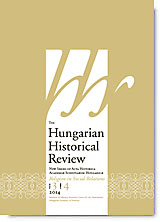The Social Integration of the Jewish Upper Bourgeoisie in the Hungarian Traditional Elites :A Survey of the Period from the Reform Era to World War I
The Social Integration of the Jewish Upper Bourgeoisie in the Hungarian Traditional Elites :A Survey of the Period from the Reform Era to World War I
Author(s): Miklós KonrádSubject(s): History
Published by: Magyar Tudományos Akadémia Bölcsészettudományi Kutatóközpont Történettudományi Intézet
Summary/Abstract: In the spirit of the principles of liberal nationalism, which dominated Hungarian political life from the Reform Era to the end of World War I, Christian politicians and intellectuals tirelessly emphasized their firm belief that, in addition to acculturating and identifying with the Hungarian nation, the Jewry must also integrate socially into majority Christian society. This call for integration also allotted a task to the Christian members of Hungarian society, namely that they welcome their compatriots into their social circles. The views of contemporaries notwithstanding, according to whom the greatest aspiration of the Jewish haute bourgeoisie was to gain acceptance into the circles of the traditional social elites and their families, this striving was really only characteristic of the second and third generations of upper-class Jewish families. With regards to the last stage of integration, in other words marriage into the families of the traditional elite, with one exception that confirms the rule, this was only possible for Jews if they were willing to convert. Following the 1850s, 1860s, and 1870s, decades that were more open from the perspective of integration into the social sphere, the traditional elites closed ranks. The National Casino, which had been founded in 1827, accepted its last Jewish member in 1872. Neither the Country Casino that was created in 1883 (it was referred to as the Országos Kaszinó, i.e. the word “nemzeti,” or “national,” was replaced with “országos,” which means national in the more political sense) nor the Park Club (which was created in 1895) ever had a single Jew among their members, though both had many Christian members who had converted from Judaism. This constituted a clear contradiction of the liberal promise of social integration, though at the same time it also indicates that exclusion was not (yet) based on concepts of race.
Journal: The Hungarian historical review : new series of Acta Historica Academiae Scientiarum Hungaricae
- Issue Year: 3/2014
- Issue No: 4
- Page Range: 818-849
- Page Count: 32

